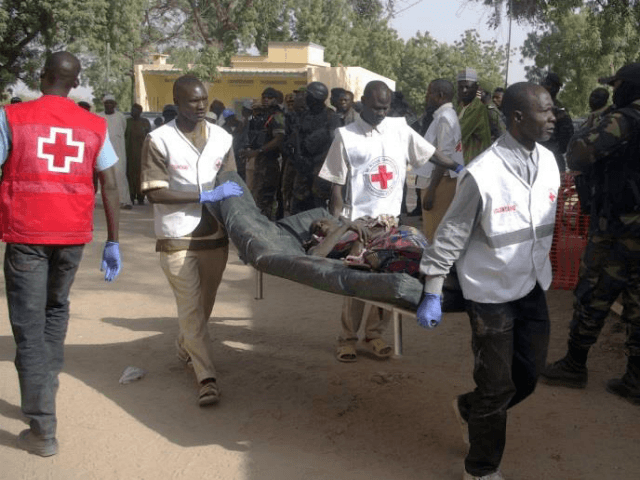Senator Ali Ndume of Borno state, Nigeria, lamented in remarks Wednesday that he does not feel safe returning to his hometown because Boko Haram’s ongoing conquest of the region is “overwhelming” to security officers.
Boko Haram, a jihadist organization that swore allegiance to the Islamic State in 2015, was founded in northeast Borno state and has expanded its activities throughout northern Nigeria and the Lake Chad region that includes parts of Chad and Cameroon. Reports throughout the year have indicated that the group has expanded activities this year, massacring entire villages and recruiting terrorists among the desperate internally displaced people living in government-organized camps, many of which cannot go home precisely because of Boko Haram.
Senator Ndume recalled that Boko Haram massacred 75 village elders in his hometown, Gwoza, Borno, and that survivors have little attachment to the government or access to basic resources like good.
Ndume was speaking in Maiduguri, the capital city of Boron, at a Senate local commission meeting, Nigeria’s Premium Times newspaper reported.
“Even as a serving senator, I still cannot go to Gwoza my home town because it is not safe,” Ndume said. “Our security operatives are trying their bests, and we have to give it to them. But the situation is overwhelming. People are dying every day, either from attacks or by hunger. We have lost many lives here.”
“There was a time in my home town Gwoza, that about 75 elders most of whom I know personally were dragged by Boko Haram to the town’s abattoir and slaughtered like animals. Only two persons survived because their bodies were covered with other people’s’ blood and the assailants thought they were dead,” Ndume recalled. “In the same Gwoza, Boko Haram had in a single day lined up young men and summarily shot them dead. These were just some stand out cases.”
Ndume did not say when the massacre occurred. Many Boko Haram attacks go unreported because of how remote
“People die every day here, and I can assure you that even today or this evening, someone may have died of hunger. I am not talking about children – I mean adults,” Ndume said, crediting unnamed NGOs with offering humanitarian aid that the government could not provide.
Ndume’s plea to the Nigerian government to act more definitively against Boko Haram – a terrorist group President Muhammadu Buhari has claimed he defeated repeatedly since 2015 – came less than a week after the governor of Borno, Babagana Zulum, warned that terrorists were entering camps hosting internally displaced people (IDP) and recruiting new jihadis.
“Truly, the Boko Haram terrorists are working on people to join them in the ongoing war,” Zulum said. “If IDPs living in camps and host communities are not given the opportunity to return to their communities to resume farming, they may be forced to join Boko Haram.”
The greater Borno area is home to nearly 2 million IDPs; Boko Haram is believed to have displaced nearly 9 million people in the Lake Chad region, according to Nigeria’s the Guardian. Those in the camps endure notoriously dire conditions, including unsanitary conditions, lack of food, and abuse by officials running the camps. A 2016 report revealed evidence that police and Nigerians soldiers were raping the people in the camps, many of them women and girls who had been rescued from sex slavery under Boko Haram. Some reported being raped, while others said they endured forced sexual relations with soldiers in exchange for food.
In 2017, the Nigerian military bombed a Boko Haram refugee camp, allegedly accidentally.
In addition to fears of recruitment, local officials have documented multiple Boko Haram attacks throughout the month. Last week, Boko Haram terrorists reportedly killed three Nigerian soldiers and took hundreds of civilian hostages in Kukawa, a town in Borno, leaving it devastated.
“The terrorists on 18 August 2020 attacked troops’ location in Kukawa town in Borno state where the attack was vehemently thwarted,” defense spokesman John Enenche said at time, insisting Kukawa was “calm.”
In July, Boko Haram jihadists published a video in which they executed five local humanitarian aid workers.
The Church of the Brethren in Nigeria (EYN), which operates in Boko Haram territory, estimated in July that the group had launched at least 50 attacks on local communities throughout 2020. The high number of attacks corresponded with warnings earlier in the year from the Christian charity Open Doors that the Chinese coronavirus pandemic was helping Boko Haram, letting the jihadis fill the void where police authority had been.
“Boko Haram and its splinter groups are opportunistically expanding into the void of governance left when all attention and resources are focused on containing the coronavirus,” David Curry, the CEO of Open Doors, said in April.
After Boko Haram declared allegiance to the Islamic State in 2015, it rebranded as the “Islamic State West Africa Province” (ISWAP). Nigerian officials, including Buhari, have justified their claims that Boko Haram is defeated by claiming that ISWAP is an offshoot of Boko Haram, not run by original Boko Haram leader Abubakar Shekau, who allegedly did not agree to becoming a subsidiary of a foreign group. The Nigerian government has repeatedly claimed to have killed Shekau, only for him to resurface in propaganda videos.

COMMENTS
Please let us know if you're having issues with commenting.